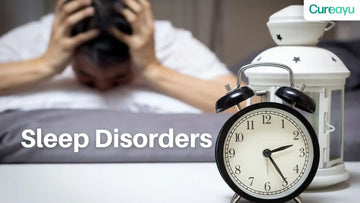Sleep disorders disrupt the critical restorative process of sleep, affecting millions worldwide. From insomnia to sleep apnea, understanding sleep disorders symptoms is essential for identifying the root cause and finding effective treatments. These symptoms not only impact your ability to rest but can also severely affect your physical and mental well-being. Dive into this detailed guide to explore what sleep disorders are, their types, symptoms, causes, and available treatments.
Sleep is vital for the body's rejuvenation, yet many individuals face challenges in achieving a good night's rest. Sleep disorders, also known as sleep-wake disorders, are conditions that interrupt this essential biological function. These disorders can result in difficulty falling asleep, staying asleep, or maintaining an adequate sleep-wake cycle.
The effects of sleep disorders extend beyond mere fatigue, influencing mood, energy levels, cognitive functions, and overall health. Recognizing and understanding sleep disorders symptoms is a significant step toward addressing the problem and reclaiming the quality of life that restful sleep provides.
Also Read: Understanding Hypersomnia Symptoms: A Deep Dive into Causes, Signs, and Effective Treatment
What Is Sleep Disorder?
Sleep disorders are a group of conditions that impair sleep quality, timing, or duration, hindering a person's ability to function during the day. These conditions can arise from lifestyle habits, mental health issues, physical ailments, or even environmental factors.
There are numerous types of sleep disorders, each with unique characteristics. Some may cause excessive daytime sleepiness, while others prevent an individual from falling asleep or staying asleep. Regardless of the type, these disorders disrupt the natural sleep cycle, leading to significant health risks like heart disease, obesity, and depression.
Types of Sleep Disorders
- Insomnia
Insomnia is characterized by difficulty falling asleep, staying asleep, or waking up too early. It can be acute, lasting a few days, or chronic, persisting for months or years.
- Sleep Apnea
This condition involves interrupted breathing during sleep. Obstructive sleep apnea is the most common form, caused by a blockage in the airway, often leading to loud snoring and frequent awakenings.
- Restless Legs Syndrome (RLS)
RLS causes an uncontrollable urge to move the legs, especially in the evening or at night, leading to disrupted sleep patterns.
- Narcolepsy
Narcolepsy is a neurological disorder characterized by sudden sleep attacks during the day, often accompanied by muscle weakness (cataplexy).
- Parasomnias
These include unusual behaviors during sleep, such as sleepwalking, night terrors, or bedwetting.
Sleep Disorders Symptoms
- Difficulty Falling or Staying Asleep
Struggling to initiate or maintain sleep is a hallmark symptom of insomnia.
- Excessive Daytime Sleepiness
Feeling excessively tired or falling asleep unexpectedly during the day can indicate narcolepsy or sleep apnea.
- Loud Snoring or Gasping for Air
Common in sleep apnea, loud snoring and gasping disrupt not only your sleep but also that of your partner.
- Unexplained Mood Changes
Irritability, anxiety, or depression often accompany sleep disorders due to lack of restorative sleep.
- Frequent Night Awakenings
Waking up multiple times during the night, especially with no clear reason, may signify a sleep disorder.
- Leg Discomfort or Jerking Movements
Unpleasant sensations in the legs or involuntary movements, as seen in RLS, can interrupt sleep cycles.
Causes of Sleep Disorders
- Stress and Anxiety
High-stress levels and anxiety disorders often lead to difficulty in falling or staying asleep.
- Poor Sleep Hygiene
Irregular sleep schedules, excessive screen time, or unhealthy habits can significantly disrupt sleep patterns.
- Medical Conditions
Chronic pain, asthma, and cardiovascular problems are known contributors to sleep disturbances.
- Mental Health Issues
Depression and bipolar disorder are commonly linked to various sleep disorders.
- Neurological Disorders
Conditions like Parkinson’s disease and Alzheimer’s can impair sleep quality.
- Medications or Substances
Certain drugs, caffeine, nicotine, and alcohol are known to disrupt sleep cycles.
Also Read: The Profound Importance Of Sleep
Sleep Disorders Treatment
- Lifestyle Changes
Adopting a regular sleep schedule, minimizing screen time before bed, and creating a comfortable sleep environment are effective strategies.
- Cognitive Behavioral Therapy for Insomnia (CBT-I)
CBT-I helps reframe negative thoughts and behaviors related to sleep, promoting better sleep habits.
- Medications
Doctors may prescribe sedatives, melatonin, or other medications to address specific sleep disorders.
- Continuous Positive Airway Pressure (CPAP)
CPAP devices are commonly used to treat sleep apnea by keeping airways open during sleep.
- Physical Therapy
For conditions like RLS, physical therapy or stretching exercises can provide relief.
- Alternative Therapies
Techniques like meditation, yoga, and aromatherapy have shown promise in improving sleep quality.
Conclusion
Sleep disorders are more than a nightly inconvenience—they can profoundly affect one’s physical and emotional well-being. By understanding the symptoms, causes, and treatments, individuals can take proactive steps toward better sleep health. If left untreated, sleep disorders may lead to severe complications, including chronic illnesses and mental health challenges. Early diagnosis and intervention, coupled with lifestyle adjustments, can pave the way for restful nights and energetic days. Take control of your sleep today for a healthier tomorrow.








